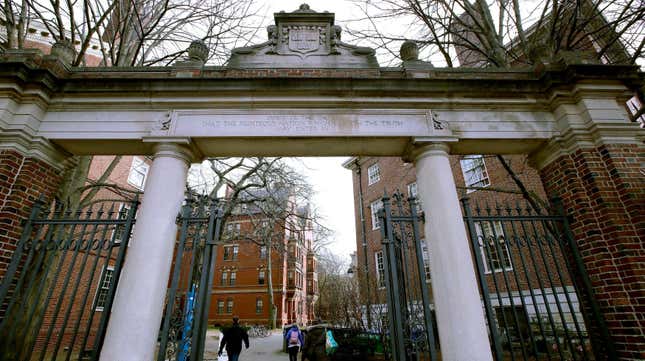
If an environmental law professor at a prominent university—who makes more than $350,000 a year advising a major oil and gas company—helps that company set up meetings with the federal government, is that lobbying? This is the question surrounding Harvard law professor Jody Freeman, who has come under increasing scrutiny in recent weeks for her paid position on the board of ConocoPhillips, as the Guardian and the Bureau of Investigative Journalism (TBIJ) reported this week.
According to two emails sent in 2021 and obtained by the Guardian and TBIJ via a Freedom of Information Act request, Freeman corresponded with John Coates, who was then the acting director of the Securities and Exchange Commission, helping to set up a meeting between ConocoPhillips executives and the SEC. The emails were sent as the SEC was preparing to propose rules around having companies report their greenhouse gas emissions, seemingly in order for the oil and gas giant to pitch its climate work to regulators in private before the agency could announce the plans in public.
In the emails, Freeman described two ConocoPhillips executives as “hugely knowledgeable, thoughtful, and interested in solving problems” and touted one’s work chairing the climate committee at the American Petroleum Institute, the industry’s leading lobbying arm.
“ConocoPhillips is widely recognized as the oil and gas industry leader on climate related disclosure,” Freeman wrote in one email.
In these emails, according to the Guardian and TBIJ, Freeman signed off as a Harvard law professor but did not disclose her paid position on the ConocoPhillips board. That, the outlets claim, is in violation of Harvard’s policy regarding individuals with financial conflicts of interest, which states that faculty “must make public disclosures of financial interests in related outside entities…when reasonable members of the audience would give weight to those interests in assessing the opinions, advice, or work they are presenting.”
Freeman told the Guardian that Coates, who is also a Harvard law professor, was aware of her affiliation with ConocoPhillips before the emails were exchanged and that she’s “compliant with the university’s conflict of interest rules.”
Freeman said in an email to Earther, with Coates cc’ed, that she “did not lobby for or initiate the request for a meeting.” Freeman said that Coates reached out to ask for connections to the company, and she attached a statement from Coates, who says he was still at Harvard when the emails were sent, corroborating her account. (“Jody’s board role at Conoco was known to me,” Coates’s statement reads. “I reached out to her first, and she did not request a meeting or ‘lobby’ me or others at the SEC for Conoco.”)
Freeman’s resume, as detailed on her faculty bio page, is full of clean energy and climate bona fides: She served as an advisor on energy and climate change for the Obama administration; she helped develop an agreement with the U.S. auto industry to set fuel efficiency standards; she’s worked with the Biden transition team to develop the administration’s climate plan. Her role with ConocoPhillips is described on her faculty page as acting as “an important advisor on climate change and the energy transition.” According to ConocoPhillips’s 2023 proxy statement, Freeman earned $367,584 in total compensation in cash fees and stock options from her position on the board.
Freeman has been on the ConocoPhillips board since 2012, but her affiliation has been raising more eyebrows of late, as the divestment movement on campuses continues to gain steam and previously staid institutions begin to reconsider their relationships with fossil fuel funding. In 2021, after years of pressure from student activists, Harvard announced that it would “phase out” investments in fossil fuels in its endowments; the divestment movement has now refocused its attention on other ways that fossil fuel money is exerting influence within academia.
ConocoPhillips’s ownership of the Willow Project, an enormous and controversial oil and gas project in Alaska approved by the Biden administration in March, means the company is drawing even more scrutiny. Divest Harvard, a student and alumni group, last month called on Freeman to exit her position with ConocoPhillips, accusing the company of “listening to the call of profit without regard for climate degradation” when it comes to the Willow Project.
“While divestment was an important step forward, the case of Jody Freeman illuminates the pervasive continued influence of fossil fuel companies and the need for a far more comprehensive dissociation,” said Phoebe Barr, a junior at Harvard and an organizer with Divest Harvard. “Conflicts of interest like this one should not stand.”
This year, Harvard’s Salata Institute for Climate and Sustainability gave Freeman funding to head up a three-year research project on corporate net-zero targets, including whether or not these targets “result in real emissions reductions.” Last week, the Guardian obtained a copy of a letter sent by faculty on the Harvard Divest steering committee to the university’s president-elect raising concerns about a “potential conflict of interest” with the Salata Institute project, given Freeman’s relationship with ConocoPhillips.
“I share the goal of moving the world to a low-carbon future as fast as possible and forcefully addressing the enormous challenges posed by climate change,” Freeman told the Guardian last week in response to the letter. “There are many ways to make a difference, and activism is very important. I have chosen to engage in several ways, including by being an independent director on the board of ConocoPhillips to help advance the transition to a low-carbon economy, and think my involvement there remains positive.”
Helping a colleague who is moving to a government position connect to a company on whose board you serve isn’t anything out of the ordinary for many figures in the upper echelons of academia. But the whole debacle illustrates a larger problem of how fossil fuel money ends up in the pockets of those with power, and how their influence can extend into the networks of other powerful friends and coworkers. Fossil fuel companies like ConocoPhillips have a long history of currying favor with elites and academics, using those reputations to improve their own. But as the climate crisis keeps careening out of control, the real question is for how long this status quo will keep being acceptable.

